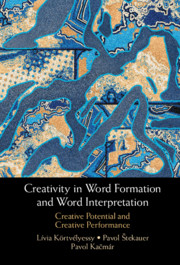Book contents
- Creativity in Word Formation and Word Interpretation
- Creativity in Word Formation and Word Interpretation
- Copyright page
- Contents
- Figures
- Tables
- Acknowledgements
- 1 Introduction
- 2 On the Notion of Creativity
- 3 Theoretical Foundations of Our Research
- 4 Methodological Principles
- 5 Research
- 6 Conclusions
- References
- Author Index
- Subject Index
6 - Conclusions
Creativity, Word Formation, and Word Interpretation
Published online by Cambridge University Press: 20 January 2022
- Creativity in Word Formation and Word Interpretation
- Creativity in Word Formation and Word Interpretation
- Copyright page
- Contents
- Figures
- Tables
- Acknowledgements
- 1 Introduction
- 2 On the Notion of Creativity
- 3 Theoretical Foundations of Our Research
- 4 Methodological Principles
- 5 Research
- 6 Conclusions
- References
- Author Index
- Subject Index
Summary
The main focus of this chapter is to evaluate the relevance of the hypotheses specified at the end of Chapter 4. The results indicate that the influence of individual indicators/subscores on creative performance cannot be determined as a single general conclusion because it varies in relation to the opposition between and/or the role of (i) different age groups; (ii) the individual creativity indicators/subscores; (iii) word-formation versus word-interpretation; (iv) the individual word-formation criteria; (v) the individual word-interpretation criteria; (vi) the nature of the tasks included in the word-formation test; (vi) the nature of word-formation processes underlying the interpretation test. By implication, there are a number of factors that, in their mutual interaction, affect the influence of creative potential through its individual creativity indicators/subscores upon creative performance in forming and interpreting new/potential complex words. Therefore, the only way to determine this influence is to assess each aspect of word-formation and word-interpretation creativity independently of one another.
- Type
- Chapter
- Information
- Creativity in Word Formation and Word InterpretationCreative Potential and Creative Performance, pp. 288 - 295Publisher: Cambridge University PressPrint publication year: 2022



